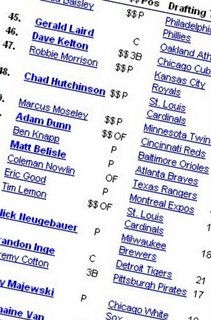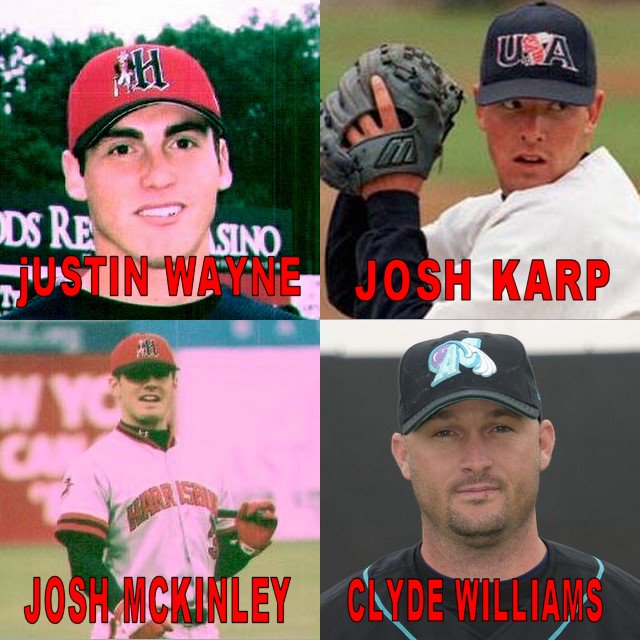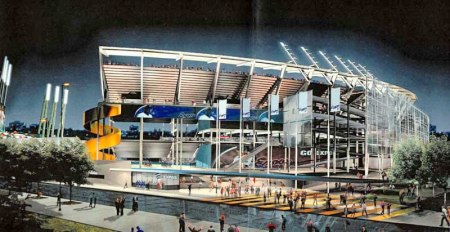JULY 31ST: A GOOD DAY AFTER ALL
 [October 31st] -- Tick-tick-tick-tick .... the clock's minute hand moved efficiently and mechanically towards it's target. Tick-tick-tick-tick. Once the sweep-hand reached the "12" at the very top of the dial, the once-a-year craziness that permeates Major League Baseball -- that period that sweeps away inhibitions and intelligence for a short period of time -- would suddenly cease (sounds like "Return Of The Archons" from Capt. Kirk's Star Trek, doesn't it??). As the managers and players and owners and fans started to shake the remaining stupor from their minds, they began to take a look at the "lay of the land" to see who survived this year's baseball trading deadline and who was a casualty.
[October 31st] -- Tick-tick-tick-tick .... the clock's minute hand moved efficiently and mechanically towards it's target. Tick-tick-tick-tick. Once the sweep-hand reached the "12" at the very top of the dial, the once-a-year craziness that permeates Major League Baseball -- that period that sweeps away inhibitions and intelligence for a short period of time -- would suddenly cease (sounds like "Return Of The Archons" from Capt. Kirk's Star Trek, doesn't it??). As the managers and players and owners and fans started to shake the remaining stupor from their minds, they began to take a look at the "lay of the land" to see who survived this year's baseball trading deadline and who was a casualty.Greg Maddux didn't survive. Sean Casey didn't survive. Ben Broussard and Julio Lugo -- they didn't survive. But Alfonso Soriano, perhaps the greatest follower of Landru -- the one most apt to be exiled by the Archons, remained.
Turns out (and this pains me to no end to say) that he just may have been right.
There was an assumption by Nationals' fans (myself included) that the players being offered were all "can't miss" prospects, players that would have magically changed our pretenders into contenders. Word out of Detroit had Joel Zumaya and Craig Monroe (and possibly others) being offered to Washington for Soriano. Having watched the playoffs, having seen what Monroe and Zumaya can do / did do, does anyone really thing that GM Jim Bowden was offered that level of talent for Alfonso and no deal could be consumated? It was more likely that the Nats  were offered something more along the lines of what the team received for Livan Hernandez, pitchers like "Chico and the Mock" (though perhaps in more quantity). An assumption has to be offered, then, that the reason no trade was made at the deadline was because the team received nothing of value for Soriano (or not enough value) and that Stan Kasten and Jim Bowden would rather choose their own replacement players through the draft rather than accept another team's "throw always," players the team obviously had no real desire to keep.
were offered something more along the lines of what the team received for Livan Hernandez, pitchers like "Chico and the Mock" (though perhaps in more quantity). An assumption has to be offered, then, that the reason no trade was made at the deadline was because the team received nothing of value for Soriano (or not enough value) and that Stan Kasten and Jim Bowden would rather choose their own replacement players through the draft rather than accept another team's "throw always," players the team obviously had no real desire to keep.
- [CF] Curtis Granderson (.260-19-68)
- [RF] Alex Rios (.302-17-82)
- [2B] Chase Utley (.309-32-102)
- [3B] David Wright (.311-26-116)
- [LF] Garrett Atkins (.329-29-120)
- [CA] Brian McCann (.333-24-93)
- [1B] Prince Fielder (.271-28-81)
- [SS] J.J. Hardy (.242-5-14)
And this starting rotation wouldn't have been to bad, would it?
- Barry Zito (16-10, 3.83)
- Jeremy Bonderman (14-8, 4.08)
- Dan Haren (14-13, 4.12)
- C.C. Sabathia (12-11, 3.22)
- Josh Johnson (12-7, 3.10)
I would think that this version of the Washington Nationals would have played into October, and could easily have been the World Series champion. The Nationals wouldn't have had to trade for, or sign as free agents, any of these players -- all they would have to have done is to choose them in the amateur drafts from 1998-2002. Each player listed was available in one of the first four rounds of each draft after the Expos made their selection.
Incredible, huh?
In the first round of the 2000 draft, the Expos chose pitcher Justin Wayne, bypassing Utley and outfielder Rocco Baldelli. In 2001, with Aaron Heilman, Bobby Crosby, Jeremy Bonderman, Noah Lowry and David Wright waiting to be chosen, Montreal went with pitcher Josh Karp. In 1998, infielder Josh McKinely was chosen ahead of Brad Lidge, Jeff Weaver, C.C. Sabathia and Aaron Rowand. Three rounds later, first-baseman Clyde Williams, was taken by the Expos instead of Zito, Mike Maroth and Ryan Langerhans.
2002, however, was the worst. With one of the top picks in the draft, Montreal chose pitcher Clint Everts, a pitcher today still toiling at the Class-'A' level. In that same first round, however, they could have chosen Zack Greinke, Prince Fielder, Jeremy Hermida, Khalil Green, Scott Kazmir, Nick Swisher, Jeff Francoeur or Matt Cain.
There can be only two possible conclusions for the team picking lumps of coal for their Christmas stockings when candy and toys were still available. Either general managers Jim Beattie (1995-2000 and Omar Minaya (2001 - 2004) were stupid and couldn't find a major league prospect in a barrel of fish or they were told by owner Ebeneezer Scrooge to draft "signable" players and not the best player available.
I vote the latter.
Jeff Loria was so cheap and difficult to work with that the city of Montreal withdrew it's funding for Labatt Park, the stadium that was to keep the team in Quebec. The following season, no English speaking radio station would carry the Expos games for what Loria demanded. Today, Loria is the owner of the Florida Marlins, and his 2005 fire sale has shown bottom lines still take precedence over wins and losses.
difficult to work with that the city of Montreal withdrew it's funding for Labatt Park, the stadium that was to keep the team in Quebec. The following season, no English speaking radio station would carry the Expos games for what Loria demanded. Today, Loria is the owner of the Florida Marlins, and his 2005 fire sale has shown bottom lines still take precedence over wins and losses.
Both owners, then, saw the amateur draft as a drain on resources, and told the team's general manager to only draft players that would sign within a particular financial parameter. That kind of draft philosophy destroyed the team's farm system, once one of the richest in the major leagues.
Justin Wayne (#1, 2000) is out of baseball having fashioned a 25-34, 3.97 career record. He started only eight games in the major leagues. Tom Mitchell (#5, 2000), the guy chosen over Garrett Atkins, never played professionally. Josh McKinley (#1, 1998), the 11th player chosen, never made it above 'AA' and retired in 2004.
Josh Karp is the poster-boy for the team's low-budget draft philosophy. Karp, a 6'5" right-hander, was drafted in the 8th round out of high school by the Atlanta Braves in the 1998 draft. Not wanting to sign for 8th round money, he played three years for UCLA (8-3, 4.29 in '99, 10-2, 5.08 in '00 and 5-2, 3,26 in '01). Though he did strike out 10 batters per 9 innings during his college career, he also walked 4 and gave up 8.50 hits. He was considered a mid-round pick at best. Yet the Expos, having the 6th pick of the draft, weren't about to pay some whipper-snapper a bonus that could reach three million dollars. They instead chose Karp, a player they assumed would be so grateful to be a first round pick that he'd sign quickly and easily. He signed all right, and for very little money. He lasted four seasons in professional ball, going home to Bothell Washington in 2005 with a 24-32, 4.74 record. That #6 pick could have brought the Expos Jeremy Bonderman .... or David Wright ... or Aaron Heilman ... or Bobby Crosby .... or .... well, you get the idea.
I'm not nearly as mad at Bowden for not pulling the trigger on that last-second trade this past summer as I was. The Nationals, having clearly expressed a commitment to signing the best players and then doing what's needed to sign them, will come away from next spring's draft with two players that will have a good chance to make a difference in Washington. The Justin Wayne's and Josh McKinley's and and Josh Karp's of the world are now a footnote in the team's history. Sure, the players they sign may never make it to the major leagues. But they also might end up being stars for years to come.
That's whats fun about the draft.
<< Home





